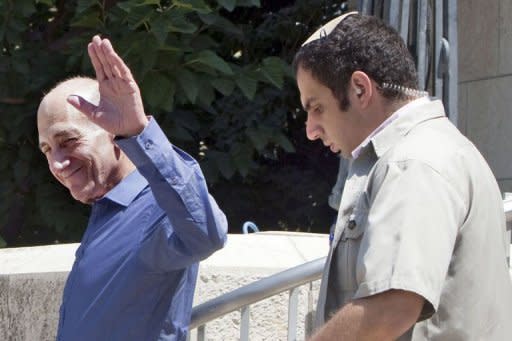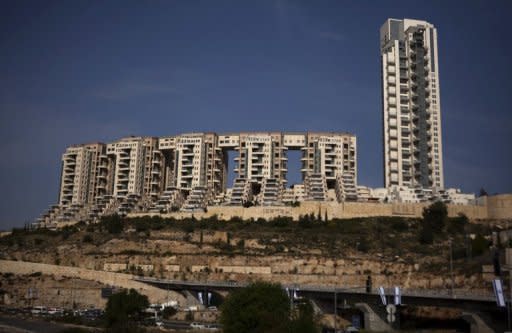Former Israeli PM Olmert cleared on two key corruption charges
An Israeli court on Tuesday found former prime minister Ehud Olmert guilty on one charge in a closely watched corruption case, but cleared him on two other charges, in a verdict he hailed as just. The decision to convict Olmert on the lesser charge of "breach of trust" over favours he granted a colleague during his time as minister could jeopardise Olmert's political future. But the Jerusalem district court's acquittal of the former leader on the two more serious corruption charges, related to his alleged receipt of cash-stuffed envelopes and multiple-billing for trips abroad, was seen as a victory for Olmert. "We unanimously decided... to convict the defendant on the felony of breach of trust," the three judges overseeing the case wrote in the verdict. Olmert still faces a second trial over allegations he accepted bribes during his time as Jerusalem mayor to smooth the way for the construction of the massive Holyland residential complex in the city. But his acquittal on the most serious charges against him, including the allegations that forced him to resign as premier in 2008, was described as a win for him by political observers. Olmert faced three primary allegations in the first trial. The first charge, on which he was convicted, related to favours he granted a former colleague, Uri Messer, during his time as trade and industry minister. Olmert was also accused of receiving hundreds of thousands of dollars from Jewish-American businessman Morris Talanski, in return for promoting his companies in Israel. And he was alleged to have engaged in multiple-billing of trips overseas, on occasions charging as many as four different institutions for the same trip, in what was dubbed the Rishon Tours affair. But he was acquitted on both those charges, with judges saying the evidence failed to prove "beyond a reasonable doubt" that Olmert was guilty. The former premier hailed the verdict outside the courtroom. "There was no corruption, I received no money, there were no cash envelopes, there was nothing from all of these things they tried to attribute to me," Olmert told reporters. "The Talanski and Rishon Tours affairs were at the heart of the accusations levelled against me and I have been cleared on both these cases. It was all false," he said. He acknowledged his conviction on the third set of allegations, but said the judgment described his behaviour as "procedural misconduct." Following massive criticism and calls for his resignation, state prosecutor Moshe Lador convened a news conference at which he defended the decision to file the charges against the former premier. "The law forces us to file indictments when the evidence is substantial and there is a reasonable chance for conviction. This is also our public duty," he said. "Had we chosen to close these cases, and not to bring them to the public and distinguished inquiry in the court, we would have been abusing our office." Lador rejected the charge that the state attorney's office caused Olmert to resign as prime minister, and said that he would not be resigning and that prosecutors cannot be expected to resign any time they do not win in court. "In democracies, the court does not always accept the prosecution's stance," he said. Israeli law states that a "public servant" found guilty of a "an act of deception or breach of trust that harms the public" can be imprisoned for three years. But Israeli daily Haaretz pointed out that the average punishment for people convicted of breach of trust is two months of community service. Olmert was mayor of Jerusalem from 1993 to 2003, after which he served as a cabinet minister, holding the trade and industry portfolio as well as several others, before becoming premier in 2006. He led the centre-right Kadima party into government, but resigned from the premiership in September 2008 after police recommended that he be indicted in several graft cases. He has consistently proclaimed his innocence, calling the allegations against him a "ruthless witch-hunt." Deliberations on Olmert's sentence are set to begin in September. In the meantime, he faces allegations in a separate case that he accepted bribes in return for helping the developers of the Holyland complex in Jerusalem.




